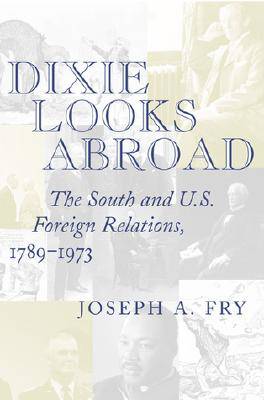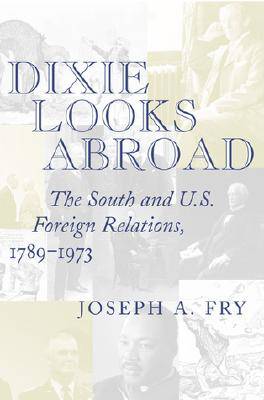
- Retrait gratuit dans votre magasin Club
- 7.000.000 titres dans notre catalogue
- Payer en toute sécurité
- Toujours un magasin près de chez vous
- Retrait gratuit dans votre magasin Club
- 7.000.0000 titres dans notre catalogue
- Payer en toute sécurité
- Toujours un magasin près de chez vous
Dixie Looks Abroad
The South and U.S. Foreign Relations, 1789--1973
Joseph A FryDescription
As America's most self-conscious section, the South has exercised an important and often decisive influence on U.S. foreign relations, but the extent of this influence has been largely unexplored by historians. In this groundbreaking study, Joseph A. Fry provides a comprehensive overview of the South's role in U.S. international involvement from 1789 to 1973, revealing the enormous impact of southern pressure on broader national interests.
In a gracefully written and engaging narrative, Fry chronicles the South's numerous foreign policy opinions over time, including its opposition to closer relations with Great Britain and war with France in the 1790s, its leadership in the War of 1812, its flawed diplomatic attempts during the years of the Confederacy, and its fifty-year protest against the increasingly assertive Republican-dominated political agenda following the Civil War. With the election of Woodrow Wilson, Fry shows, the South reversed its tendency toward isolationism and consistently supported Wilson's activist foreign policies. The South sustained this interventionist mind-set into the 1970s, ardently supporting cold war containment policy.
Fry is careful to note that southerners seldom presented a completely united front on foreign affairs. Yet even while disagreeing among themselves, he argues, they consistently viewed the world through a distinctly southern lens and acted on a variety of perceived common interests, including a dedication to honor and patriotism, a determination to protect slavery, a proclivity for personal violence, a commitment to partisan politics, a concern for economics, and a preoccupation with race.
Though the South's foreign policy opinions varied widely through the years, Fry's extraordinary work affirms that Dixie has always held considerable clout on the world stage.
Spécifications
Parties prenantes
- Auteur(s) :
- Editeur:
Contenu
- Nombre de pages :
- 334
- Langue:
- Anglais
Caractéristiques
- EAN:
- 9780807127452
- Date de parution :
- 01-01-02
- Format:
- Livre relié
- Format numérique:
- Genaaid
- Dimensions :
- 160 mm x 237 mm
- Poids :
- 703 g

Les avis
Nous publions uniquement les avis qui respectent les conditions requises. Consultez nos conditions pour les avis.






